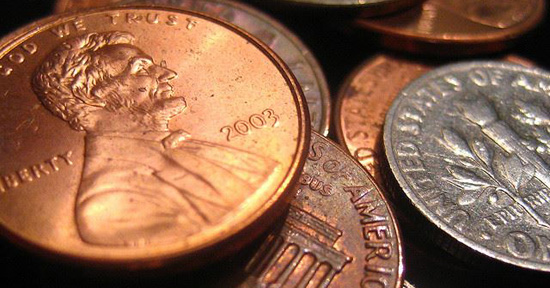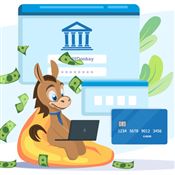23 Reasons Why Being Cheap is Bad
Being cheap is not always smart. Here are 23 research-backed reasons why being cheap can cost you. Read this, your health may depend on it.
There's a fine line between being conscious of how and what you spend and adopting a cheapskate attitude.
 |
| © r-z (CC BY 2.0) via Flickr |
HEALTH IMPACT OF BEING CHEAP
While you may think your wallet has nothing to do with your health, connecting the dots between the two is easier than you think. When you look at the scientific data on how being cheap impacts your physical and mental well-being, it all adds up to a not-so-pretty picture.
1. Cheaper foods can make you fat
Hitting the fast food drive-thru on your way home from work is convenient and won't cost you much money, but you'll pay the price in another way. A 2014 study looked at how economics influenced the foods people buy and among those who opted for cheaper processed foods, obesity rates tended to be higher.
2. It may lead to cancer
Skimping on your vacation destination could save you big bucks, sure, but at what cost? A report from Cancer Research UK found that cancer rates among seniors in the United Kingdom have increased sevenfold since the 1970s. The suspected cause? Cheap vacation packages to tropical destinations that were widely popular in the '60s, and the desire to have a tan.
3. It can delay healing
Generic medications are supposed to be just as effective as the brand names, but research suggests that the way we perceive cheaper drugs impacts how they work. In a study of Parkinson's disease patients, subjects who were given a placebo drug that was priced at $1,500 showed greater improvement in their condition versus those who were given a placebo valued at $100.
4. There may be some emotional fallout
Money can't buy happiness. Rolling in the dough doesn't mean you'll be more satisfied with your life. In fact, according to an extensive study of generosity, giving more is linked to higher happiness levels. Specifically, the more of your income you're willing to give away to charity, the less likely you are to experience depression.
5. Cheap wine can give you more than just a hangover
If you're a wine drinker and you normally pick the cheapest selection, it may be time to upgrade your tastes. According to a lawsuit filed against 28 California wineries earlier this year, certain low-end wines contain arsenic levels that are as much as 500 times higher than the recommended daily intake. That's a prime example of how being cheap can leave more than just a bad taste in your mouth.
6. You can get a serious stomachache
Food poisoning is an extremely unpleasant illness to deal with that most of us blame on poor food handling, but sometimes the problem lies with the products you're buying. A Consumer Reports analysis of inexpensive chicken breasts sold in grocery stores found that 97% of packages harbored strains of salmonella bacteria, which can do a serious number on your digestive system.
7. Cheap foods endanger heart health
Ramen noodles are a staple of any broke college student's diet. But if you're still eating them post-graduation, you may be putting your heart at risk. Researchers at Baylor University linked the cheap noodles to higher rates of metabolic syndrome in Asian women, a condition that can lead to high blood pressure and increase the odds of developing heart disease.
8. You may be more likely to develop diabetes
Diabetes is a difficult health condition to manage, so if you're worried about becoming diabetic, it may be time to cut out those relatively cheap and convenient Big Macs and Whoppers. In a study of Singaporean men and women, researchers from the University of Minnesota determined that eating fast food correlated to higher rates of type 2 diabetes.
9. There's a greater risk of stroke
Salt, a main ingredient in many inexpensive processed foods, does more than just add flavor. Research has shown that for every 500 mg of sodium you consume each day beyond the 1500 mg recommended by the American Heart Association, your stroke risk jumps by 17%.
10. Serious illnesses may go undetected
If you're dodging regular check-ups because you don't want to cover the out-of-pocket costs, you could be setting yourself up for a major health problem. A Commonwealth Fund survey showed that 4 in 10 Americans scrimp on routine health care, but spending a few bucks on a doctor visit is worth it if it turns out you have an issue that requires treatment.
BEING CHEAP CAN BACKFIRE FINANCIALLY
The whole point of being cheap is to save more, but it doesn't always work out that way. Sometimes, the upfront savings are outweighed by the long-term cost when a frugal money move doesn't go the way you planned.
11. You could end up shortchanging yourself
If you're on the cheapo bandwagon, snagging something for free seems pretty sweet. However, it can work against you at the checkout. In one study, shoppers were given the choice between getting a 33% discount on a specific product and getting 33% more of the product at its original price. Overwhelmingly, shoppers perceived getting the freebie as the better deal even though they were actually paying more per unit.
12. It can lead to overspending
Using a coupon to save a few bucks on a purchase can be a good move, but it’s also one that can end up costing you big in the end. A 2006 study found that when shoppers had a coupon that involved making a minimum purchase in order to score savings, they spent substantially more compared to shoppers who weren't limited by a purchase requirement.
13. You'll buy things you don't need
Adopting a cheap-is-better mindset could lead you to spend on things that aren't essential if it seems like a great deal. Another study showed that the closer a coupon is to its expiration date, the more likely you are to buy the corresponding product, even if it's not something on your shopping list.
14. You could make a critical error when buying a home
The housing market is chock full of bargains these days, but focusing solely on the sale price is a big mistake. Older homes are less expensive to buy, but according to the National Association of Home Builders, your bank account will still take a harder hit over time as you’ll have to constantly maintain it. Overall, you'll spend about 3.95% of the home's value annually on these expenses for a property built before 1970 versus 2.53% for a structure built after 1999.
15. You could wind up in debt to Uncle Sam
Sometimes the cost of hiring a professional to handle your tax filing is well worth it (rather than trying to go the cheapie route of doing your taxes yourself). In 2014, the IRS estimates that 2.6 million mathematical errors showed up on Americans' tax returns, resulting in 1.7 million notices of adjustment being sent out. Something as simple as a misplaced decimal could add hundreds or thousands of dollars onto your tax bill.
16. It can be wasteful
The grocery store is a big money drain for most people; the more you can avoid spending while you're cruising the aisles, the better. There's a trade-off, however, since going the cheap route may lead to more waste. In a 2012 study of college students, participants said they'd rather buy less expensive produce in bulk versus higher priced items in more convenient packages, even if it means they'd end up throwing some of it away.
OTHER DRAWBACKS OF BEING CHEAP
To wrap things up, we looked at a few more ways being cheap can impact other areas of your life. Some of the things we found might be enough to make you think twice about maintaining your hardcore thrifty habits.
17. It's not great for the economy
If you're the kind of person who pays attention to where your clothing is made, you may be subconsciously making a statement about certain products. Researchers at the University of Missouri concluded that shoppers equate American-made clothing with a higher price, leading them to opt for cheaper garments produced in other countries. The study suggests that the impact of that belief is reduced sales for U.S. apparel manufacturers, which could drag down the larger economy.
18. Your taste buds may suffer
Choosing the store-brand foods over the name brands will easily save you some money, but you're often sacrificing a certain amount of quality. According to a Consumer Reports match-up of 19 products, the savings for store brands ranged from 5% to 60% but in terms of taste, the premium brands won out the majority of the time.
19. It makes the roads more dangerous
Gas prices have fallen sharply over the last year and while drivers may see cheaper gas as a boon, there's an unintended downside. A joint paper published in 2013 found a strong correlation between an increase in traffic fatalities and lower gas prices. Although there may be more accidents when gas prices are low because people are driving more, always be sure to drive safely.
20. Car repairs can become more costly
When something breaks on your car, the mechanic may give you a choice of using brand name or generic parts to complete the repair. While generic parts may be as much as 38% cheaper to buy, they could cost you more in terms of labor. According to one report, labor tends to be 6% higher on average when generic parts are used.
21. It's bad news for the environment
As gas prices decline, car sales tend to increase, and many Americans are snapping up fuel-hungry vehicles as they become less concerned about gas consumption. In November 2014, for example, gas prices hit $2.67 a gallon and sales of SUVs and trucks went up by nearly 10%. The corresponding effect of people cashing in on lower gas prices increases the amount of greenhouse gas emissions released into the air by all those gas guzzlers.
22. It can hurt your chances of getting hired
Part of making a good impression during a job interview is ensuring that your outward appearance is up to snuff. In a study involving mock interviews, respondents were more likely to consider someone as a suitable candidate when they wore clothing with luxury labels. The mere perception of wealth resulted in more favorable treatment overall, so the next time you're headed to an interview, leave the bargain basement finds in the closet.
23. You may get the short end of the salary stick
Aside from influencing whether you're able to land a job, being cheap can also affect how much money you're able to make. The same study of luxury clothing brands also found that candidates who wore designer gear to the interview were viewed as more deserving of a higher salary compared to someone who wore no brand names at all.
FINAL WORD
If you're teetering on the dividing line between being frugal and being cheap, you need to be clear on the consequences of straying too far in the wrong direction. Taking the cheap way out doesn't guarantee that you're going to get ahead financially. In fact, as the research we found shows, it can often have the reverse effect.
Rebecca Lake is a journalist at CreditDonkey, a credit card comparison and reviews website. Write to Rebecca Lake at rebecca@creditdonkey.com. Follow us on Twitter and Facebook for our latest posts.
Note: This website is made possible through financial relationships with some of the products and services mentioned on this site. We may receive compensation if you shop through links in our content. You do not have to use our links, but you help support CreditDonkey if you do.
Read Next:






